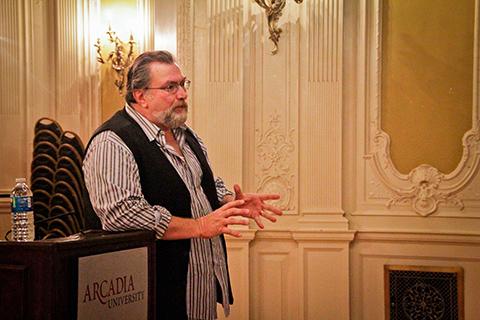Author Jonathan Maberry Thrills and Inspires Arcadia Students

By JEN RETTER ’16
Photography KARA WRIGHT ’14
Earlier this month New York Times bestselling author and multiple Bram Stoker Award-winner Jonathan Maberry gave a talk to the community on “The Ticking Clock: Constructing a Nail-Biter of a Thriller.” Arcadia University’s Master of Fine Arts in Creative Writing program hosted the event, planned in affiliation with the Philadelphia Writers’ Conference free forums, in Grey Towers Castle.
Maberry, whose novels include Ghost Road Blues, Dead Man’s Song, Bad Moon Rising and Patient Zero, began his lecture by suggesting that aspiring writers learn the business of publishing. His contention: A writer who not only develops his or her craft but also understands the art of selling will have a greater chance of success in the industry. “It’s said that creative people aren’t good at business, which isn’t true. You have to learn the business, even if that means taking classes,” said Maberry.
Maberry shifted the conversation to craft, noting that anyone interested in writing thrillers should have a thorough understanding of the genre and its conventions. He said that a thriller must excite the reader with high stakes and great risks that are both compelling and believable. The writer should include elements that change the reader’s perception of a given situation, as well as “tighten the noose around the main character’s neck.” The thriller mode is defined by a race against time, and, in order to get the audience interested and invested, there must be a chance that something could go wrong.
 In addition to talking about craft, Maberry talked about the business of book publishing.
In addition to talking about craft, Maberry talked about the business of book publishing.Since topical plots on cutting-edge subjects are what sell today, research is a key factor in writing any genre. “Good research can ramp up a novel,” said Maberry. “A writer must know current events, and always ask, ‘What’s next?’”
Maberry went on to give suggestions about pacing in thrillers, notably that a writer should aim to leave the reader wanting more at the end of each chapter. “A thriller is not supposed to be sedate, it’s supposed to be fast. They don’t carry deadwood, they move along,” said Maberry, explaining that in today’s society the chapters of thrillers tend to be shorter and more action-packed.
This change in pace has affected the average length of the thriller as well. Because many factors go into determining how long a novel will be, especially monetary limitations, Mayberry advised: “Use your craft. Come up with the best version of the story that will sell the most despite length constraints.”
Maberry even shared a few tips on the topic of character development. In the thriller genre in particular, the main character, who must grow and acquire a sense of a purpose, should have qualities that allow the audience to develop a genuine care for him or her. In addition, Maberry encouraged the audience members who aspire to write a series to always pitch a character with series potential, as each novel itself should be a stand-alone.
 Maberry speaks with MFA faculty.
Maberry speaks with MFA faculty.To conclude his lecture, Maberry discussed how to avoid clichés and picking up ideas from other writers. Comparing it to an architect studying buildings, Maberry said, “If you want to write a great thriller, read a book from the genre that you like five or six times: first as a reader, then to deconstruct it and see the craft in it. Each time, pay attention to a different thing: both what is provided and what the reader brings.”
As the presentation came to a close, the inspired writers in the audience began to ask for Maberry’s opinion and advice on topics of writing that moved out of the realm of the thriller genre. “Everyone seemed energetic, and asked a lot of questions,” said Isard. Sincerely interested in the discussion, the audience prompted Maberry to provide additional tips on writing thrillers that they would be able to apply to all genres in the future.
Ultimately, the goal of the event was to do just that: get members of Arcadia’s student body more engaged in creative writing through the influence of a guest speaker. “Everyone in writing should find time to converse with as many writers as possible,” said Isard. Judging by the notepads and raised hands, the writers in the audience benefited from the MFA Program’s mission to expose students to a wide range of lecturers.


